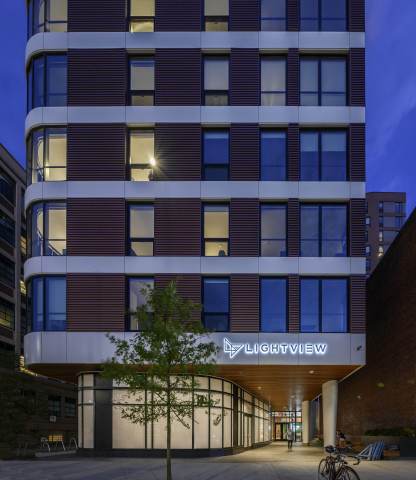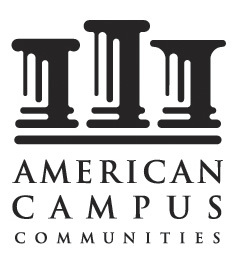American Campus Communities’ LightView Achieves First Private Student Housing LEED Platinum Green Building Certification in Boston and Announces Renewable Energy Contract
American Campus Communities’ LightView Achieves First Private Student Housing LEED Platinum Green Building Certification in Boston and Announces Renewable Energy Contract
BOSTON--(BUSINESS WIRE)--American Campus Communities (NYSE: ACC) announced today LightView, the most sustainable student housing community at Northeastern University, will source renewable energy for the 310,000 square-foot space and has been awarded U.S. Green Building Council’s (USGBC) highest level of green building certification: LEED (Leadership in Energy and Environmental Design) Platinum. LEED is the most widely used green building rating system in the world and an international symbol of excellence.
“Our team is honored to receive this prestigious LEED Platinum certification to recognize our passion to find ways to incorporate sustainability in ways that is compatible with affordability,” said James Wilhelm, executive vice president, public-private partnerships for American Campus Communities. “With smart, sustainable construction and operations including sourcing green energy, we are committed to doing our part in shaping a brighter future for students, employees, campuses, communities, and the planet.”
American Campus Communities signed an agreement with Direct Energy Business to source 6,678,000 kWh of renewable energy. According to the Environmental Protection Agency (EPA) Greenhouse Gas Equivalencies Calculator, the same amount of electricity produced using conventional fuels such as coal, emits a national average of 5,205 tons of carbon dioxide.
“We are glad to support American Campus Communities’ transition from being sustainability-minded to sustainably-achieving with renewable energy solutions,” said Wayne Simpson, Direct Energy Business Account Executive. “We’re excited to have been chosen for this project and look forward to seeing the many resulting benefits from this agreement.”
LightView, located at 744 Columbus Avenue in Boston, was thoughtfully designed and constructed to maximize residents’ health and well-being while minimizing the use of water, energy and other natural resources. The student community is on campus and steps away from classrooms, shops, restaurants and public transportation, helping students live a healthy lifestyle while minimizing their environmental impact.
To create a healthy indoor environment, the company strategically placed intact air-barriers that separate each dwelling, ensuring better energy efficiency, air-quality, comfort and sound-attenuation, adjacent apartments to low-VOC paints, adhesives, flooring and carpets. Building materials were also selected for environmental purposes to limit the impact associated with greenhouse gas emissions including locally sourced materials that were high in recycled content. Other green features include:
- high-efficacy LED lighting throughout
- high-efficiency, low water laundry
- low-flow shower heads, lavatory faucets and toilets
- drought tolerant plantings
ACC leads the student housing industry in environmental sustainability with 37 LEED-certified projects across the country. Below is a list of several baseline features ACC implemented as practical and measurable strategies in achieving LightView’s LEED certification. Certification is proof that buildings are going above and beyond to ensure the space is constructed and operated to the highest level of sustainability.
Baseline features for LEED certification include:
Energy
- ENERGY STAR appliances
- Motion/occupancy sensors - in both offices and auxiliary spaces
- LED lighting through the community and units
- Programmable and zoned thermostats in common areas
- Timers on hot tubs and fire pits to reduce gas consumption
- HVAC commissioning, testing, adjusting and balancing (maximizes efficiency)
- Building Automation System (BAS)
Water
- Low-flow plumbing fixtures and aerators
- 1.28 gallons per flush efficiency toilets
- Native plant landscaping
- Advanced Irrigation controls
Waste
- Touchless hand dryers (replace paper products)
- Recycling programs
- Durable, long-lasting floors and countertops
Indoor Environmental Quality
- Low-VOC paint
- Ceiling fans in each bedroom
- Safer Choice cleaning products (meet U.S. EPA safer product standards)
- Dilution control system (ensures proper mixing of cleaning chemicals)
LEED certification ensures electricity cost savings, lower carbon emissions and healthier environments where people live, work, learn, play and worship. According to the USGBC, in the United States alone, buildings account for almost 40 percent of national CO2 emissions, but LEED-certified buildings have 34 percent lower CO2 emissions, consume 25 percent less energy and 11 percent less water, and have diverted more than 80 million tons of waste from landfills. LEED was developed with a philosophy that sees buildings as living, breathing organisms. Modern buildings are a collection of systems working together in order to help the building perform.
“LightView’s LEED certification demonstrates tremendous green building leadership,” said Mahesh Ramanujam, president and CEO, USGBC. “LEED was created to make the world a better place and revolutionize our buildings and communities by providing everyone with access to healthy, green and high performing buildings. LightView is a prime example of how the innovative work of project teams can create local solutions that contribute to making a global difference.”
Opened in 2019, LightView was the first developer-led, equity-financed student housing project in the city of Boston. ACC developed this 825-bed, 20-story community in partnership with Northeastern University. It also marked a key milestone for the “Housing A Changing City: Boston 2030” initiative, which aims to improve the quality and quantity of student housing in Boston. As a result, LightView helps free up housing needed for the local community workforce.
“Buildings are responsible for an enormous amount of global energy use, resource consumption and greenhouse gas emissions and have a significant impact on our personal health and well-being,” said Ramanujam. “Green buildings allow us to live and work more sustainably in ways you can experience – in your health, the air you breathe, the water you drink. They offer us a better quality of life, while also lowering global carbon emissions, reducing electricity and water bills, and creating new green jobs.”
About American Campus Communities
American Campus Communities, Inc. is the largest owner, manager and developer of high-quality student housing communities in the United States. The company is a fully integrated, self-managed and self-administered equity real estate investment trust (REIT) with expertise in the design, finance, development, construction management and operational management of student housing properties. As of September 30, 2020, American Campus Communities owned 166 student housing properties containing approximately 111,900 beds. Including its owned and third-party managed properties, ACC's total managed portfolio consisted of 204 properties with approximately 139,900 beds. Visit www.americancampus.com.
About the U.S. Green Building Council
The U.S. Green Building Council (USGBC) is committed to a prosperous and sustainable future through cost-efficient and energy-saving green buildings. USGBC works toward its mission of market transformation through its LEED green building program, robust educational offerings, an international network of local community leaders, the annual Greenbuild International Conference & Expo, the Center for Green Schools and advocacy in support of public policy that encourages and enables green buildings and communities. For more information, visit usgbc.org and connect on Twitter, Facebook and LinkedIn.
About Direct Energy
Direct Energy is one of North America’s largest retail providers of electricity, natural gas, and home and business energy-related services with nearly four million customers. Direct Energy gives customers choice, simplicity, and innovation where energy, data, and technology meet. A subsidiary of Centrica plc (LSE: CNA), an international energy and services company, Direct Energy, its subsidiaries and/or affiliates, operate in 50 U.S. states plus the District of Columbia and 8 provinces in Canada. To learn more about Direct Energy, please visit www.directenergy.com.
Forward-Looking Statements
In addition to historical information, this press release contains forward-looking statements under the applicable federal securities law. These statements are based on management’s current expectations and assumptions regarding markets in which American Campus Communities, Inc. (the “Company”) operates, operational strategies, anticipated events and trends, the economy, and other future conditions. Forward-looking statements are not guarantees of future performance and involve certain risks and uncertainties, which are difficult to predict. These risks and uncertainties that could cause actual results to differ materially from those expressed or implied in the forward looking-statements include those related to the COVID-19 pandemic, about which there are still many unknowns, including the duration of the pandemic and the extent of its impact, and those discussed in our filings with the Securities and Exchange Commission, including our Annual Report on Form 10-K for the year ended December 31, 2019 under the heading “Risk Factors” and under the heading “Business - Forward-looking Statements” and subsequent quarterly reports on Form 10-Q. We undertake no obligation to publicly update any forward-looking statements, including our preleasing activity or expected full year 2020 operating results, whether as a result of new information, future events, or otherwise.
Contacts
Gina Cowart
Gcowart@americancampus.com

